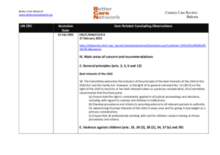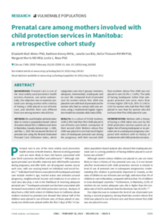Displaying 911 - 920 of 2221
This article presents the findings from a systematic review conducted on interventions for foster children and foster carers.
The present article reports findings of a narrative review of self- and carer-report mental health data that addressed the research question: Do adolescents who reside in statutory out-of-home care (OOHC) systematically underreport their mental health difficulties in population studies?
This country care review includes the care-related Concluding Observations adopted by the Committee on the Rights of the Child.
This article reports a three-stage process of developing a model of teacher education to encompass provision for Looked After Children in schools in the UK.
This resource compiles critical data from a variety of sources on children, youth, and families who came in contact with the US child welfare system in federal fiscal year (FY) 2017.
The objective of this study was to examine prenatal care among women with a history of having a child placed in out-of-home care, and whether their care differed from care among women who did not.
This study utilized administrative data that reviewed child welfare cases in a Midwestern state in the U.S. to examine interactions between teamwork and parent engagement associated with the permanency of children in out-of-home care.
The aim of this study is to explore whether girls who are in residential care have fewer emotional skills than their peers, and if so, whether these girls have similar socio-emotional skills to girls who also experience disadvantaged environments but live with their families.
This study examined the predictive power of the Strength and Difficulties Questionnaire (SDQ) for predicting foster placement breakdown.
This paper reports on the initial formative phase of a pilot feasibility randomised controlled trial; SOLID (Supporting Looked After Children and Care Leavers In Decreasing Drugs, and Alcohol) that aimed to adapt two evidence-based psychosocial interventions, Motivational Enhancement Therapy and Social Behaviour and Network Therapy, which will aim to reduce substance misuse by looked after children.


